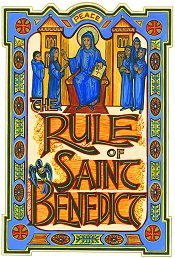There are many things in life that confuse me. For example, why does lemonade have imitation flavoring, but furniture polish contains real lemon juice? Why does “fat chance” and “slim chance” mean the same thing? If something “goes without saying,” why do people still say it? Why is it that if someone tells you that there are four billion stars in the universe you believe them; but if there’s a sign that says wet paint, you have to touch it to be sure? Some things just don’t make any sense. Read More
obedience | Deacon Allen Tatara Catholic Speaker
On the Inside; On the Outside
After going on a couples retreat at the Benedictine monastery St. Meinrad, I wanted to learn more about the Rule of St. Benedict. I bought a book that described the three vows that convey the core of the Rule. These are stability, obedience, and conversion of life.
 Stability is a calling to remain where we are and to find grace in each relationship, place or situation. Basically this means that we can find God at the very center of our lives including in our family, friends, marriage, church community, etc.
Stability is a calling to remain where we are and to find grace in each relationship, place or situation. Basically this means that we can find God at the very center of our lives including in our family, friends, marriage, church community, etc.
Obedience is the ability to listen to what God is saying and responding to what we hear. We need to figure out what God is asking us to do and then respond to that call.
Conversion of life is really the balance to the concept of stability. While stability calls us to remain, conversion of life calls us to change and grow. We’re not fully the person God created us to be; so we need to open ourselves – which enables God to change our hearts.
We hear this same message in today’s readings. We need not fear for the Lord is always with us. We must find God in our daily lives, rejoice in Him being there, and then have the ears to listen to what He wants us to do.
In these remaining weeks of Advent, let us focus on remaining present and faithful to others. Let us listen and respond to God’s direction for us. And let us remain open to being transformed so we can experience conversion of life as we await the One who is to come. With Christ all things are possible; without Christ, nothing makes sense.
In 1967, Paul Newman starred in the prison drama Cool Hand Luke. Luke Jackson (Paul Newman) knows how to win at poker, even with bad cards, by using his smarts and playing it cool. When Luke finds out his mother has died, he plots his escape; when he’s caught, he simply escapes again. Soon, Luke becomes a symbol of hope and resilience to the other men in the prison.
![]() On the Feast of St. Luke, we are indebted to him for so much information about the early Church, but we know so little about him.
On the Feast of St. Luke, we are indebted to him for so much information about the early Church, but we know so little about him.
He was of Gentile origin, a Greek from the city of Antioch in ancient Syria, and he made his living as a physician, and he was the companion of St. Paul. But Luke is mainly known as the author of the third Gospel and the book of the Acts of the Apostles. It is in these writings that we will find three reasons why he has become a symbol of hope and resilience to all of us.
First, he had a special love for Mary, the mother of Jesus. It is from Luke that we have most of what we know about Mary: her steadfast faith, her child-like trust and obedience to God’s will, her generosity and readiness to serve others, her acceptance of God’s plan, and her pondering prayerfulness.
Second, he focused in on Jesus’ compassion and mercy for those who suffered. As a doctor Luke was very familiar with sickness and suffering. Luke calls us to be aware of the needs of each other, and especially those without the necessities of life, for those who are lost, and for anyone who is sick or suffering.
And third, he had a passion for evangelization. Luke wanted to spend his life spreading the good news about Jesus, both in his writings as well as in his journeys with St. Paul.
May we strive to be more like Cool Hand St. Luke: cool-headed, independent, individualistic spirit that won’t submit to the power of the evil one. May we be a symbol of hope to others by having a deep-seeded faith like Mary, taking care of those who are less fortunate, and spreading the good news about Jesus to everyone.
 After having been miraculously released from jail and returned to the Temple to continue their preaching in the name of Jesus, the apostles were re-arrested and brought again before the Sanhedrin, the ruling council of the Jews. They were accused of two things:
After having been miraculously released from jail and returned to the Temple to continue their preaching in the name of Jesus, the apostles were re-arrested and brought again before the Sanhedrin, the ruling council of the Jews. They were accused of two things:
- They had continued to preach in “that name” (their accusers could not bring themselves even to mention the name of Jesus), even though they had been strictly forbidden to do so; and
- They were blaming the Jewish leadership for Jesus’ death.
The apostles were not in the least fazed by these accusations. These men who were so fearful at the time of Jesus’ death now spoke out boldly. “It is better for us to obey God than men!” they told their judges. (Acts 5:27-33)
There is a lesson in there for all of us. How often are we fearful of speaking out for what is right? How often do we revert to silence when someone else is being accused of something that they didn’t do? How often do we question our faith when things become too difficult?
We need to follow the example of the apostles and realize that we already have the power of the Holy Spirit to push us forward. We have no need to be afraid or to worry about what could happen. Jesus gave us the Holy Spirit to lead and guide us in everything that we do so we may boldly preach in his name to the entire world.
Let us pray that our testimony and actions always be directed and confirmed by the Holy Spirit, who is given to all who respond to God with the obedience that comes from faith.
Our Gospel today was “the Annunciation”, the same Gospel we used for the Solemnity of the Immaculate Conception. Very often, you will see Annunciation in a painting or stained glass window, and it’s depicted with one striking detail: Mary, holding in her hands or reading an open book. One artist has said this is to show Mary reading Isaiah, learning that a virgin would give birth to the savior. Another artist said that it shows her devotion to The Word – the Word that she would one day bring into the world as Jesus Christ.
However you interpret this, it remains a compelling way of thinking of Mary, especially as we near Christmas, and as we think more deeply about The Word Made Flesh. And as we reflect on today’s Gospel, I want to focus on one word in particular that recurs in this passage. It’s a word Luke uses again and again in the story of the Nativity, three times alone in just this short passage. That word is: “Behold.” In literal terms, it means: “to see,” or “observe.” But in scriptural terms, it goes much deeper. Read More
Prayer to St. Joseph: Model of Obedience
Saint Joseph, one of the most visible traits of your soul is obedience to God. Woven into your entire life is faithfulness, obedience, and confidence in the Lord who loves you.
At the beginning of the Gospel, Mary, your betrothed, finds herself pregnant. As a compassionate man, you decide to let her go home secretly so as not to expose her. But God asks you to take her to you, nonetheless, as a faithful spouse. Mindful of this first message from God, you join him in embarking on the ever mysterious path of the Incarnation. Read More
Today is the feast of St. Benedict. He was born in 480 within a wealthy family in the Roman town of Norcia, east of Rome. He eventually responded to a call to lead establishing communities where followers could “seek God” and confront the contemporary pagan culture. It was here where he constructed a rule of life and organization for these communities. The Rule of St. Benedict was written for those serious about seeking God and being formed in His image. Read More






